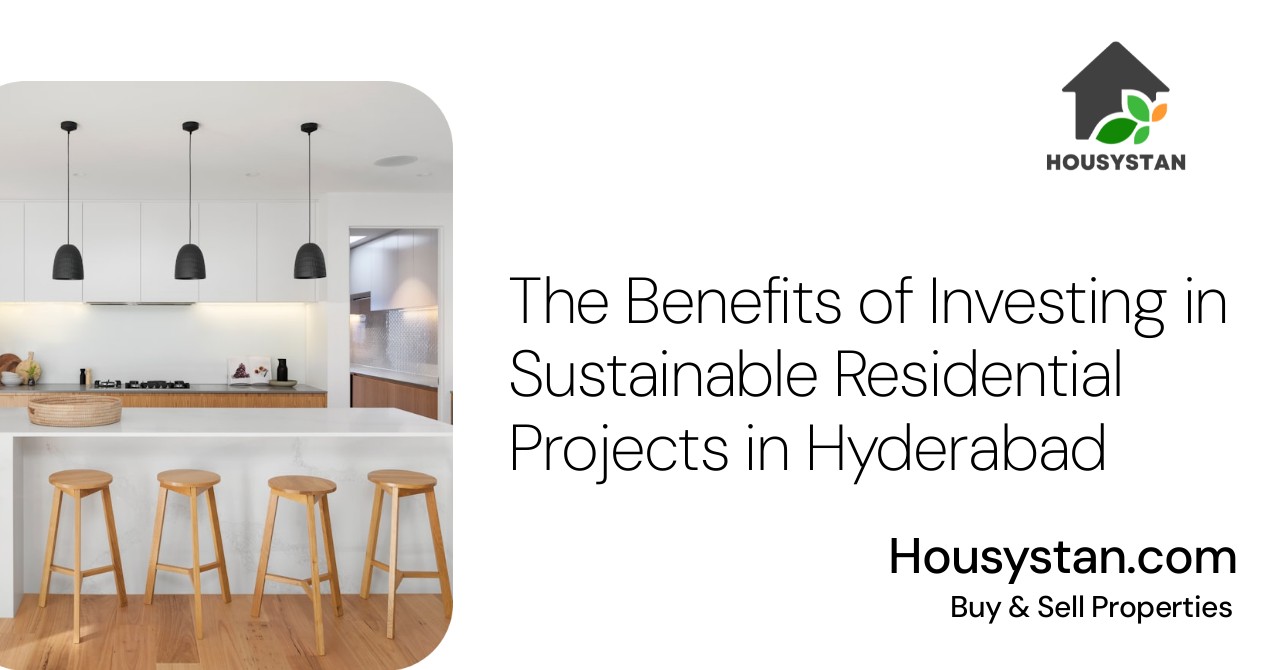The Benefits of Investing in Sustainable Residential Projects in Hyderabad
Read latest blogs and articles from Housystan

The Information mentioned here was last updated on:
19/2/2026The Benefits of Investing in Sustainable Residential Projects in Hyderabad
Introduction: Hyderabad’s Real Estate Evolution
Hyderabad, often dubbed the “City of Pearls,” is witnessing a dynamic transformation in its real estate sector. As the city’s population grows and urbanization accelerates, the demand for innovative, eco-friendly housing is surging. Sustainable residential projects are no longer a niche trend but a compelling necessity. Forward-thinking investors are closely watching this evolution, recognizing that sustainable developments not only address environmental concerns but also deliver long-term value and robust returns. This article explores the multifaceted benefits of investing in sustainable residential properties in Hyderabad, offering insights for homeowners, investors, and the broader community.
- Verified Tenants/Buyers
- Unlimited Property Listing
- Zero subscription/charges fee
Understanding Sustainable Residential Projects
Sustainable residential projects are designed with a holistic approach that prioritizes environmental responsibility, energy efficiency, and the well-being of residents. These projects incorporate green building materials, renewable energy sources, water conservation strategies, and smart waste management systems. In Hyderabad, such developments are gaining traction as both buyers and developers become increasingly conscious of their ecological footprint.
Why Hyderabad is a Hotspot for Sustainable Investments
Hyderabad has emerged as a top destination for real estate investment, thanks to its robust infrastructure, thriving IT industry, and cosmopolitan lifestyle. The city’s proactive policies to encourage green construction—backed by the Telangana government—have paved the way for a new wave of sustainable residential projects. Strategic location, affordable land prices, and a growing population of environmentally aware homebuyers make Hyderabad an ideal market for eco-conscious real estate ventures.
Key Benefits of Investing in Sustainable Residential Projects
1. Enhanced Property Value
Properties built with sustainable principles tend to appreciate faster and retain value over time. Buyers are increasingly willing to pay a premium for homes that guarantee lower utility bills, superior indoor air quality, and environmentally responsible construction. Sustainable features such as solar panels, rainwater harvesting systems, and energy-efficient appliances make these homes more attractive in a competitive market, ensuring higher resale value.
2. Reduced Operational Costs
One of the most tangible benefits for homeowners and investors is the significant reduction in operational expenses. Sustainable buildings use less water and energy, translating into lower monthly utility bills. Advanced insulation, smart lighting, and efficient HVAC systems contribute to substantial savings, making these properties more cost-effective in the long run.
3. Healthier Living Environments
Sustainable residential projects prioritize occupant well-being. They are designed to maximize natural light, improve ventilation, and reduce exposure to harmful chemicals. The use of non-toxic building materials and efficient waste management ensures cleaner air and healthier lifestyles for residents. In Hyderabad’s increasingly urban context, these benefits are invaluable for families seeking a safe and nurturing environment.
4. Environmental Impact and Conservation
Investing in eco-friendly housing contributes to the broader goal of environmental preservation. Sustainable projects in Hyderabad often incorporate green spaces, native landscaping, and rainwater harvesting, reducing the strain on local resources. By choosing sustainable properties, investors play a direct role in reducing the city’s carbon footprint and promoting responsible urban growth.
5. Regulatory Incentives and Compliance
The Telangana government has rolled out several incentives to promote green construction in Hyderabad. Developers and investors benefit from fast-track approvals, reduced property taxes, and additional Floor Space Index (FSI) for sustainable projects. These policy measures not only lower the entry barrier for new investments but also ensure compliance with national and international green building standards.
6. Future-Proof Investments
As the global focus shifts toward sustainability, regulations and market expectations are evolving rapidly. Investing in sustainable residential properties in Hyderabad is a strategic move to future-proof your assets. Such developments are more resilient to regulatory changes and are likely to remain in demand as consumers and governments prioritize greener living standards.
7. Community and Social Impact
Sustainable projects often foster a sense of community by integrating shared spaces, urban gardens, and amenities that encourage social interaction. These developments also generate employment opportunities in green construction and maintenance, contributing to local economic growth. For investors, the social impact of such projects enhances brand reputation and investor confidence.
Emerging Trends in Hyderabad’s Sustainable Real Estate
The sustainable real estate market in Hyderabad is characterized by a range of innovative trends. Developers are increasingly adopting green certifications such as IGBC and LEED, which assure buyers of a project’s environmental credentials. Smart home automation, rooftop solar panels, and electric vehicle charging stations are becoming standard features in new developments. Additionally, there is a growing emphasis on mixed-use communities that combine residential, commercial, and recreational spaces to create holistic, self-sustaining neighborhoods.
Overcoming Challenges in Sustainable Development
Despite its many advantages, investing in sustainable residential projects is not without challenges. Higher initial construction costs, limited availability of green building materials, and the need for skilled labor can pose hurdles. However, these barriers are gradually being addressed through government incentives, increased awareness, and technological advancements. As the market matures, economies of scale are expected to drive down costs and make sustainable housing even more accessible.
Conclusion: A Smart Choice for the Future
Hyderabad’s sustainable residential real estate sector offers a compelling proposition for forward-thinking investors and homeowners. The blend of economic, environmental, and social benefits makes these projects a wise long-term investment. As awareness grows and regulatory support strengthens, sustainable housing is poised to become the new standard in Hyderabad’s property market. By investing in green projects today, you are not only securing financial returns but also contributing to a healthier, more resilient city for generations to come.